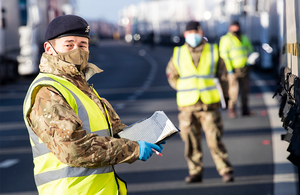A wholesale independent review of children’s social care will set out to radically reform the system, improving the lives of England’s most vulnerable children so they experience the benefits of a stable, loving home.
Education Secretary Gavin Williamson will today (Friday 15 January) launch the review which aims to raise the bar for vulnerable children across the country, delivering on a 2019 manifesto commitment that pledged to look at the care system to make sure children and young adults get the support they need.
In a speech to children’s charities and sector organisations, the Education Secretary will also announce that he has appointed Josh MacAlister to lead the review.
A former teacher, Mr MacAlister founded the social work charity Frontline in 2013. He will step down from his role as Chief Executive to lead the review.
The review will reshape how children interact with the care system, looking at the process from referral through to becoming looked after. It will address major challenges such as the increase in numbers of looked after children, the inconsistencies in children’s social care practice, outcomes across the country, and the failure of the system to provide enough stable homes for children.
Running throughout the review will be the voices and experiences of children, young people or adults who have been looked-after, or who have received help or support from a social worker. Their experiences will be considered and reflected sensitively and appropriately, with their views included in full in the work.
Education Secretary Gavin Williamson will say:
We have known for some time that despite the best efforts of hardworking and dedicated social workers, the children’s social care system is not delivering a better quality of life and improved outcomes for those it is designed to help.
This review will be bold, wide-ranging and will not shy away from exposing problems where they exist. Under Josh MacAlister’s leadership, it will benefit from his understanding of the challenges facing the system and his experience of improving outcomes for children and young people.
It is part of the golden thread that runs through everything we are doing to level up society, especially for those who are too often forgotten or marginalised. It is going to help us raise the bar for these vulnerable children, it’s going to help us improve their life prospects and most importantly, it’s going to help give them the chance to achieve their potential and not be held back from the futures they deserve.
During the virtual launch event today (Friday), Josh MacAlister will launch a ‘Call for Advice’ to help shape the early work of the review and invite applications for an ‘Experts by Experience’ group to advise him on how to include the voices of people with a ‘lived experience’ of the children’s social care system. The review will consult widely and bring in a broad range of expertise.
Chair of the Review Josh MacAlister will say:
If 2020 showed us the grit, commitment and creativity of social workers, teachers and other professionals, then 2021 is our chance to think afresh about how we support children without the safety, stability and love that many of us take for granted.
This review will listen deeply and think boldly. That is why I am recruiting for an ‘Experts by Experience’ Group that will direct an ambitious effort to hear the diverse experiences of children and families who have had social workers. I also need advice and challenge as we start this review, which is why I’m launching a Call for Advice.
Deep down I think many of those working in the children’s social care system and certainly many of those who have experience of it, know that radical change is needed. My commitment is that this review will deliver a wide-ranging plan to extend the joy, growth and safety of childhood and the esteem, love and security of family life to all children.
The Review will address the clear need for change that supports children to achieve their potential. Children who have been in care comprise 25% of the homeless and 24% of the prison population. Over a third of care leavers (39%) are not in education, employment or training, compared to 13% of all 19-21-year-olds and just 13% progressed to Higher Education by age 19 compared to 43% of all other pupils.
In addition, statistics published today revealed the number of serious incident notifications between April and September 2020. Every death or harm of a child is tragic and we are working to understand the impact of COVID on the nature of serious incidents. This data will provide important information to the care review to help address major challenges.
The Department for Education will publish terms of reference for the review, setting out the themes and questions that will be addressed and how it will respond to the changing needs of children in care or at risk of going into care, especially given the impact of the pandemic.
These will include how to improve accountability for those responsible for children’s outcomes, how to ensure children have a positive experience of care, and how to support and strengthen families – helping children stay safely with their families where possible.
The Education Secretary will also announce today that the Adoption Support Fund will continue beyond March 2021, helping new adoptive and special guardianship families overcome challenges through therapies like family support sessions, or music and play activities. Nearly 64,000 families have benefitted from the fund since it was launched in 2015.
It builds on the government’s commitment to levelling up across the country, starting with children and families – particularly the most vulnerable – to reduce the impacts and costs to both the children themselves and society.
The review of children’s social care builds on recent work from the Department of Education to support the most vulnerable children in society, including an investment of almost £4.4 million to extend Covid-19 response programmes run by major children’s charities aimed at reaching ‘hidden’ children, as well as setting out plans to create a National Centre for Family Hubs that will improve families’ access to vital services across the country.
There was also confirmation in November’s Spending Review of an additional £24 million investment in 2021-22 to expand capacity within secure children’s homes, as well as £165 million funding for the Government’s Troubled Families programme.
The Government will also respond to the consultation on unregulated provision, where the views of the sector and care-experienced young people were sought on banning the placement of children under the age of 16 in this provision and introducing national standards for provision for 16 and 17-year-olds.

